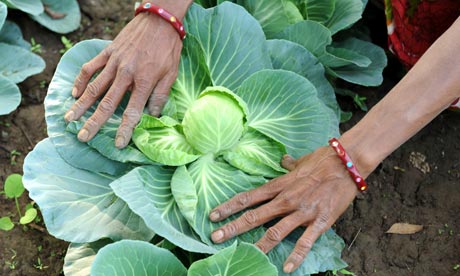
This item horrified a lot of people:
Animal miscarriages from new fungus or virus in Roundup-read crops?
A reader asked:
What would you say to someone like myself who wants to make a difference
but has no clue where to start? I think that is a big question with
my generation.
Well, there’s the
pumpkin dance.
But you don’t have to start with that.
HFCS may be the easiest thing to start with, because it’s labelled. Don’t
buy any product that has High Fructose Corn Syrup (HFCS) in it.
You’ll be surprised how many
do. At restaurants, check the condiments, don’t use them if they
have HFCS, and inform the wait staff why you’re not. When people
ask why you’re doing all this tell them. Here’s some background on
High Fructose Corn Syrup and Obesity.
This kind of thing is working:
Hunts removes HFCS from all its Ketchups.
 About pesticides, buy local and organic food, like at
Whisk.
Ask for local food at other stores.
Help with a community garden. Join a CSA. Write a letter to the editor.
About pesticides, buy local and organic food, like at
Whisk.
Ask for local food at other stores.
Help with a community garden. Join a CSA. Write a letter to the editor.
You don’t have to do all of these things; these are some ideas.
Start small and just do something. Every little bit helps, and you’ll
get more ideas as you go along. Your example will help others start.
Also, don’t feel bad about it seeming intimidating. On the one hand we
have the most sophisticated marketing methods the world has ever known,
fueled by megabucks from transnational corporations. On the other hand we
have, er, a few college professors like Michael Pollan, a few farmers who
observe and analyze like Joel Sallatin, a few poets like south Georgia’s
own
 Janisse Ray, and so on. Even so, local and organic food is one of
the few industries that has kept booming right through the economic
downturn. People actually want food that’s good for them and tastes good!
Janisse Ray, and so on. Even so, local and organic food is one of
the few industries that has kept booming right through the economic
downturn. People actually want food that’s good for them and tastes good!
Fortunately, around here we also have Georgia Organics!
More about that later.
-jsq
Safe local food movements are no longer a passing fad as consumers avoid the dangers and fears associated with processed industrialized food. Any number of associated causes drives concerns about GMO plants, pesticides, and other chemicals. With many options and systems designs available for cost effective ways of safe food production, one system with unique opportunities is aquaponics.











